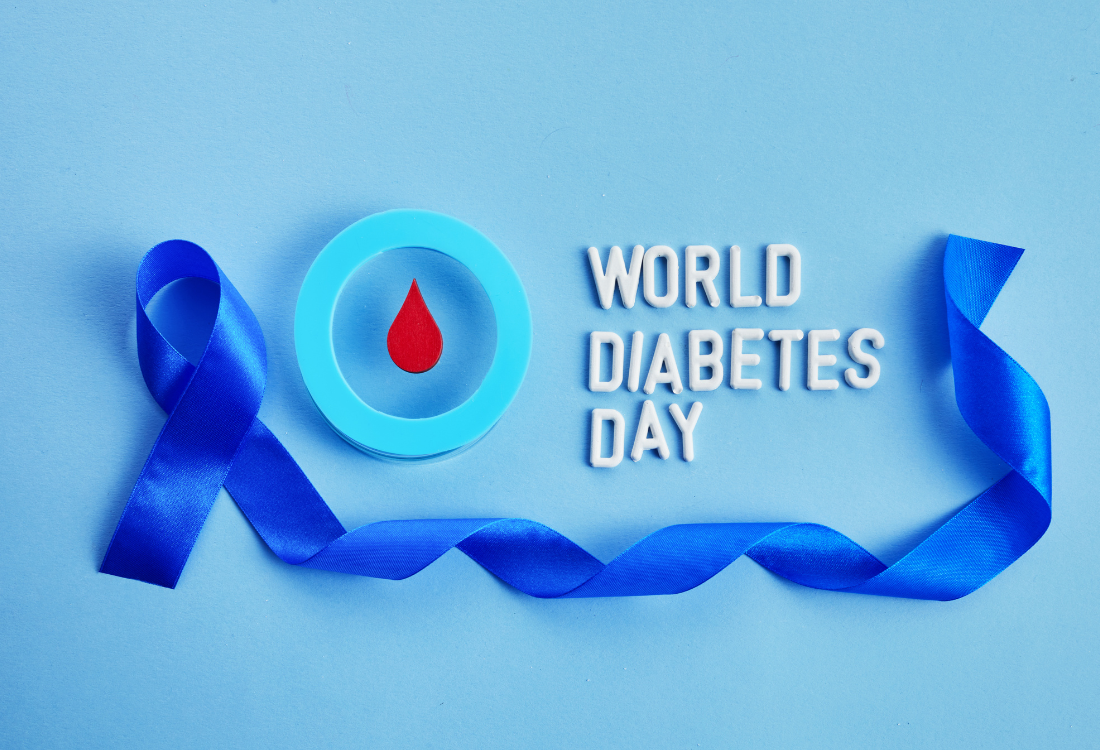Diabetes is a growing health concern in the UK, with millions affected and numbers rising every day. Type 2 diabetes, in particular, is strongly linked to excess weight and lifestyle factors (such as stress, sleep, and sedentarism), making it a preventable disease and one that, if it develops, can be brought into remission in many cases.
In this article we are looking at type 2 diabetes and, given the mass of conflicting nutritional advice, we ask: Where should you start?
World Diabetes Day gives us an opportunity to highlight how medically supervised nutritional weight loss programmes offer a potent path to positive change, as evidenced in the DiRECT study and described very clearly in a TEDx talk by Dr Sarah Hallberg of Virta Health. Losing weight with a well-designed diet can dramatically improve blood sugar control, a crucial step in reducing the risk of the chronic complications of diabetes, and one that can even lead to diabetes remission for many individuals. Taking control of your weight is one of the most important proactive steps you can take for your long-term health.
What Diet Is Best For Diabetes?
Sometimes it is said that the best diet is one you can stick to, but that ignores many important aspects of weight loss, especially when it is more than just the physical weight that needs a solution. When looking for a quality diet and lifestyle programme to achieve weight loss and resolve health issues, professional guidance is essential for safe, effective, and lasting success. As with all these methods, there is no one-size-fits-all solution. However, the diets used in programmes that really benefit type 2 diabetes do have factors in common: they are medically supervised, evidence-based, address carbohydrate intake, especially the intake of refined carbohydrates, and are tailored to individual requirements.
The most effective programmes focus not only on weight loss but also on metabolic health and hormone balance, which are both strongly influenced by the dietary components. Thus, while weight loss through calorie restriction is important, it is just as important to ensure that the calorie restriction is achieved using a balance of nutrients that best helps to reverse the hormonal changes that drive the metabolic disturbances of type 2 diabetes.
Prioritising a reduction in refined carbohydrates and sugars will go a long way to stabilising blood glucose levels and improving insulin sensitivity. However, the total daily carbohydrate intake is also critical, even if those carbs come from healthy sources. A focus on high-quality protein and non-starchy vegetables will help to maintain energy levels and to control hunger. Fats should be used in moderation, according to the desired calorie deficit; those that are included should be healthy fats, including the monounsaturated fats (especially olive oil) and the omega-3 polyunsaturated fats (from oily fish such as salmon, sardines, mackerel).
Diabetes Weight Loss Diet
For individuals living with obesity and with (or at risk of) type 2 diabetes, a structured, medically supervised weight loss plan offers a clear path to better health. Some of these plans are designed to achieve rapid, significant weight loss while ensuring the body receives all essential nutrients.
Medically supervised diets, such as the ketogenic diet used in the PronoKal PnK Programme, are clinically proven to deliver fast results while preserving vital muscle mass. Losing muscle can slow down your metabolism, making subsequent weight maintenance harder. By prioritising protein intake and strictly controlling carbohydrates, these programmes help the body burn stored fat effectively, leading to major improvements in weight and metabolic markers. The diet and lifestyle components of these programmes are always tailored to each individual’s specific needs and are overseen by experienced medical professionals, ensuring both safety and effectiveness throughout the weight loss journey and recovery of metabolic health.
Can A Diabetic Do Keto?
For individuals with diabetes, following a keto diet can be highly effective and very beneficial, but it must always be done under medical supervision.
-
Benefits: When correctly monitored, this approach is highly effective for weight loss and for improving blood sugar control in insulin resistance, reducing the need for antidiabetic medication.
-
Safety: Rapid changes in carbohydrate intake require a doctor to closely monitor blood parameters and adjust medications (especially insulin) to ensure safety and nutritional completeness.
-
Comprehensive Management: Successful management also requires ongoing support and coaching on lifestyle factors, including stress management, sleep, and physical activity.
This holistic approach, which addresses the root causes of weight gain, provides the best chance for lasting improvements in metabolic health and well-being.
Ready To Stop The Uncertainty And Achieve Lasting Results?
Contact Dr Philip Bazire today to discuss a medically supervised weight loss programme designed to support diabetes prevention and long-term remission, and build a sustainable diet strategy for your long-term health.
Image Source: Canva





